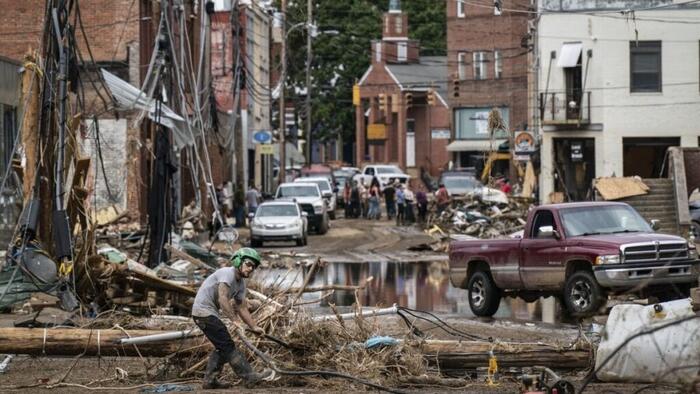In the aftermath of Hurricane Helene, which devastated ten southeastern states, many Americans are struggling to secure basic necessities such as food, water, and medical assistance. Despite the severe conditions that have left substantial destruction, survivors have largely been dependent on the efforts of individual volunteers and nonprofit organizations for aid. Groups like Samaritan Purse and Aerial Recovery have stepped up to fill the void left by the federal government, which has been criticized for its inadequate and slow response to this national crisis. The situation has raised serious concerns about the effectiveness and priority of federal disaster response efforts under the Biden administration. Many have expressed their frustrations, believing that the government is neglecting its citizens in favor of other priorities, such as providing aid to illegal immigrants and foreign countries.
President Biden’s visit to Georgia seemed more symbolic than substantive, with promises of $20 million in aid that many feel will not arrive in a timely or effective manner. This pales in comparison to the significant funding being allocated elsewhere, such as over $640 million for illegal immigrants and a staggering $180 billion in support for Ukraine. The disparity raises questions about the government’s commitment to American citizens, especially as it struggles with a monumental natural disaster and widespread displacement of its own people. Survivors are reporting an absence of visible government aid workers and National Guard troops as they try to navigate the disaster’s aftermath. Instead of receiving immediate help, they confront bureaucratic hurdles, including waiting for FEMA assistance through online applications when many areas lack electricity and internet access.
Eyewitness accounts from the Asheville area indicate that federal workers and National Guardsmen are not fulfilling their expected roles as first responders; instead, they appear to be preoccupied with administrative tasks. Reports suggest that crucial military resources, like transport helicopters, have been rendered idle due to a lack of orders to assist those in dire need. Local volunteers, including experienced relief workers, have expressed frustration with this situation, especially given the military’s historical ability to mobilize swiftly in response to crises. The lack of proactive engagement from federal agencies has shocked many, as the structure and command are supposedly in place to address such emergencies promptly.
The actions of the federal government have sparked outrage and skepticism, particularly concerning recent comments from Secretary of Homeland Security Alejandro Mayorkas, who cited insufficient funds for FEMA. Critics argue that despite the agency’s financial mismanagement, billions remain allocated for other less pressing issues, particularly concerning illegal immigration. Many believe the Biden administration’s prioritization of funding noncitizen support undermines the government’s ability to assist its citizens during critical emergencies. The consequences of such policies have fueled growing resentment and a sense of abandonment among those who were directly impacted by the storm, who desperately need assistance.
Florida’s Attorney General has been vocal in calling for accountability and a redirection of FEMA funds back to American citizens instead of illegal immigrants. The monitoring of the agency reveals a troubling transformation from a disaster response entity to a resettlement agency focused on providing assistance to noncitizen populations. In this context, local voices have expressed anger over inadequate compensation for disaster relief, with a North Carolina flood victim encapsulating the sentiment by rejecting paltry monetary offers and emphasizing the disparity with the benefits afforded to illegal immigrants. The federal government’s lack of responsiveness in aiding ordinary Americans raises fundamental questions about its priorities and effectiveness.
As communities rely on each other for support amid abandonment by federal agencies, this incident serves as a stark reminder of the challenges citizens face in times of emergency. With insufficient leadership and a clarity of purpose from the government department tasked with overseeing disaster relief, many are left feeling helpless and betrayed. This crisis underlines a broad deterioration in the social contract between the government and the public it is sworn to protect and highlights growing disillusionment with federal priorities that seem to favor unvetted immigration policies over addressing the needs of American citizens. The prevailing sense of urgency to help each other reflects a societal resilience amid systemic failures, but it also walks a dangerous line, questioning the cohesion and integrity of the nation’s emergency response capabilities.

